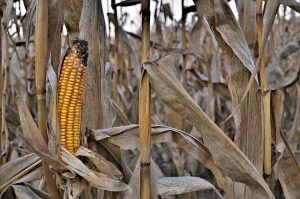 An infestation into the local corn crop is being called a catastrophe by the Grain Farmers of Ontario.
An infestation into the local corn crop is being called a catastrophe by the Grain Farmers of Ontario.
Chair Markus Haerle says a type of ear rot, which is spread by soil and air, grew quickly after the increase in moisture this fall. He says the mold releases a vomitoxin called Deoxynivalenol or ‘DON’.
“It makes some corn very toxic, and if it’s in certain levels of toxicity it becomes unharvestable and unusable because if it’s being passed through a processing facility, some facilities actually multiple that ratio of DON by two or three times, depending on what process it is. If you feed that to animals, they can actually get sick,” explains Haerle.
Haerle says southwestern Ontario has seen a lot of infestation cases, but there are reported cases across the province.
“The major infestation areas are more in southwestern Ontario, basically everything around the Great Lakes and into the London area. That’s where the highest rates of infestation are,” says Haerle.
He says the Grain Farmers of Ontario will be meeting with the Minister of Agriculture this week to discuss the issue.
The Grain Farmers of Ontario have written an open letter to their members, which can be found below.
An open letter to our farmer-members,
We are facing one of the most severe outbreaks of DON in corn that we have ever seen, and some areas of the province are being hit especially hard. I understand the feeling of frustration that you, our farmer-members, have with this issue. You want to know that Grain Farmers of Ontario is at work on your behalf, and you want to know what we are doing.
Grain Farmers of Ontario has made this issue its top priority. We consider this issue at a catastrophic level at this point and it is only getting worse and we have all hands on deck engaging with industry, Agricorp, and the provincial and federal governments.
I want to dispel any rumours that Grain Farmers of Ontario’s actions or decisions have stalled any step of the selling, buying, or insurance process. This is untrue. I specifically made sure that no barriers had been created through our work. There is nothing anyone is waiting for from us.
We are hearing several issues that need to be addressed:
– Cash flow and revenue loss
– Markets for high DON corn
– Clarity from Agricorp on crop insurance
– Testing protocols
Work to address these issues has been ongoing at Grain Farmers of Ontario.
Both Barry Senft, CEO of Grain Farmers of Ontario, and I have been in regular contact with Ernie Hardeman, Minister of Agriculture, Food and Rural Affairs. On November 5, the Minister came out to the field of District 7 (Waterloo, Oxford) Director Kevin Armstrong to see firsthand just how devastating DON is to our farmer-members. The Minister was receptive to working with us to find solutions and ways to help farmers.
As a result of our time with Minister Hardeman, the Minister is convening a meeting of industry leaders, including Grain Farmers of Ontario, in the next week. The corn industry has a finely tuned value chain from field to fork or fuel, and an issue like this has impact at all levels. The minister is asking each person to come to the meeting with three creative ideas to address the issue.
I know that there are frustrations around the insurance process, and we continue to recommend to everyone that they engage Agricorp as soon as possible.
We are in discussions with Agricorp as they assess the situation, and we are pressing them on questions related to crop insurance including:
– What is the definition of an unmarketable crop?
– When are fields going to be written off?
– How will the salvage benefit work?
We all know that AgriStability is not going to help and we are exploring other relief options for revenue loss, including AgriRecovery.
Grain Farmers of Ontario took the initiative to work with OMAFRA to host a meeting in late October with our industry partners to explore solutions to the DON problem. We brought together more than 40 people – from growers, to elevator operators, to feed industry representatives, to government officials, and ethanol producers. Some ideas were generated at this meeting and Grain Farmers of Ontario has been working on getting them implemented:
– Ethanol companies doing high DON runs
– Storage solutions for farmers without storage
– Solutions to sampling and testing protocols
Grain Farmers of Ontario is working with industry partners to ensure timely, accurate information is available for harvest decisions, sampling, storing, disposing, and cleaning. We will continue to provide more resources to you. It is fair for farmers to expect that there will be consistency in sampling and testing at elevators and that test kits will be used properly.
For those who have been impacted by this issue, this is an especially stressful time. If you need to talk to someone, please call 211 (Canadian Mental Health Line), or 1-866-531-2600 (Ontario Mental Health Helpline) to speak to someone. You are not alone.
We know you are looking for answers. Your Board of Directors and the staff at Grain Farmers of Ontario continue to be your voice to everyone involved in the grain industry and the government.
We will continue to share information via email and our website: www.gfo.ca/DON-in-corn. If you have questions or comments, please direct them to: members@gfo.ca.
Sincerely,
Markus Haerle
Chair, Grain Farmers of Ontario
226-820-6641




